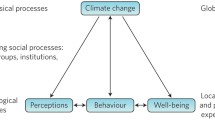Abstract
In this article, I analyze climate change as a “predictable surprise,” an event that leads an organization or nation to react with surprise, despite the fact that the information necessary to anticipate the event and its consequences was available (Bazerman and Watkins, 2004). I then assess the cognitive, organizational, and political reasons why society fails to implement wise strategies to prevent predictable surprises generally and climate change specifically. Finally, I conclude with an outline of a set of response strategies to overcome barriers to change.
Similar content being viewed by others
References
Babcock, L. and Loewenstein, G.: 1997, ‘Explaining bargaining impasse: The Role of Self-Serving Biases’, J. Econ. Perspect. 11, 109–126.
Baron, J.: 1998, Judgment Misguided: Intuition and Error in Public Decision Making, Oxford university Press, Oxford.
Baron, J.: ‘Thinking about global warming’, Climatic Change, this volume, DOI: 10.1007/s10584-006-9049-y.
Bazerman, M.: 2005, Judgment in Managerial Decision Making, Wiley, New York.
Bazerman, M. H., Baron, J., and Shonk, K.: 2001, You can't Enlarge the Pie: Six Barriers to Effective Government, Basic Books, New York.
Bazerman, M. and Watkins, M.: 2004, Predictable Surprises: The Disasters You Should Have Seen Coming and How to Prevent Them, Harvard Business School Press, Boston.
Crocker, J.: 1982, ‘Biased questions in judgment of covariation studies’, Pers. Soc. Psych. Bulletin 8, 214–220.
Diekmann, K. A., Samuels, S. M., Ross, L., and Bazerman, M. H.: 1997, ‘Self-interest and fairness in problems of resource allocation: Allocators versus recipients’, J. Pers. Soc. Psych. 72, 1061–1074.
Dunning, D., Heath, C., and Suls, J.: 2005, ‘Flawed Self-Assessment: Implications for Health, Education, and Business’, Cornell University Working Paper.
Gore, A.: 1993, Earth in the Balance, Penguin Books USA, New York.
Johnson, E. J. and Goldstein, D.: 2003, ‘Do defaults save lives?’ Science 302, 1338–1339.
Kahneman, D., Knetsch, J., and Thaler, R.: 1991, ‘The endowment effect, loss aversion, and status quo bias’, J. Econ. Perspect. 5, 193–206.
Kahneman, D. and Tversky, A.: 1982, ‘The psychology of preferences’, Scientific American 246, 160–173.
Langer, E. J.: 1975, ‘The illusion of control’, J. Pers. Soc. Psych. 32, 311–328.
Loewenstein, G. and Thaler, R.: 1989, ‘Anomalies: Intertemporal choice’, J. Econ. Perspect. 3, 181–193.
McGill, A. L.: 1989, ‘Context effects in judgments of causation’, J. Pers. Soc. Psych. 57, 189–200.
Messick, D. M. and Sentis, K.: 1983, ‘Fairness, preference, and fairness biases’, in Messick, D. M. and Cook, K. S. (eds.), Equity Theory: Psychological and Sociological Perspectives, Prager, New York, pp. 61–64.
Messick, D. M. and Sentis, K. P.: 1985, ‘Estimating social and nonsocial utility functions from ordinal data’, Euro. J. Soc. Psych. 15, 389–399.
Rawls, J.: 1971, A Theory of Justice, Harvard University Press, Cambridge, MA, p. 607.
Ritov, I. and Baron, J.: 1990, ‘Reluctance to vaccinate: Omission bias and ambiguity’, J. Behav. Dec. Making 3, 263–277.
Samuelson, W. F. and Zeckhauser, R.: 1988, ‘Status quo bias in decision making’, J. Risk Uncert. 1, 7–59.
Schelling, T. C.: 1984, Choice and Consequence: Perspectives of an Errant Economist, Harvard University Press, Cambridge, MA.
Sunstein, C.: ‘Precautions against what? The availability heuristic, global warming, and cross-cultural risk perceptions’, Climatic Change, this volume, DOI: 10.1007/s10584-006-9073-y.
Taylor, S. E.: 1989, Positive Illusions: Creative Self-Deception and the Healthy Mind, Basic Books, New York.
Taylor, S. E. and Brown, J. D.: 1988, ‘Illusion and well-being: A social psychological perspective on mental health’, Psych. Bulletin 103, 193–210.
Tversky, A. and Kahneman, D.: 1974, ‘Judgment under uncertainty: Heuristics and biases’, Science 185(4157), 1124–1131.
Wade-Benzoni, K. A.: 1999, ‘Thinking about the future: An intergenerational perspective on the conflict and compatibility between economic and environmental interests’, Am. Behav. Sci. 42, 1393–1405.
Wade-Benzoni, K. A., Tenbrunsel, A. E., and Bazerman, M. H.: 1996, ‘Egocentric interpretations of fairness in asymmetric, environmental social dilemmas: Explaining harvesting behavior and the role of communication’, Org. Beh. Hum. Dec. Processes 67, 111–126.
Watson, R. T. et al.: 2001, Climate Change 2001: Synthesis Report, Cambridge University, Cambridge.
Weber, E. ‘Experience-Based and Description-Based Perceptions of Long-Term Risk: Why global Warming Does Not Scare Us (Yet)’, Climatic Change, this volume, DOI: 10.1007/s10584-006-9060-3.
Winship, C. and Rein, M.: 1999, ‘The dangers of ‘strong’ causal reasoning in social policy’, Society 36, 38–46.
Author information
Authors and Affiliations
Corresponding author
Additional information
This paper has benefitted from the excellent input from Alex Todorov, Michael Oppenheimer, and three anonymous reviewers.
Rights and permissions
About this article
Cite this article
Bazerman, M.H. Climate Change as a Predictable Surprise. Climatic Change 77, 179–193 (2006). https://doi.org/10.1007/s10584-006-9058-x
Received:
Accepted:
Published:
Issue Date:
DOI: https://doi.org/10.1007/s10584-006-9058-x




